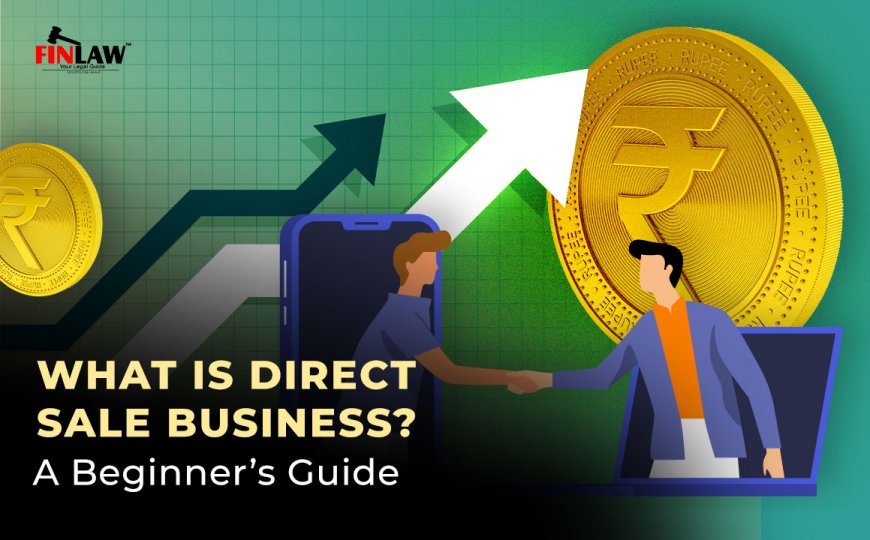What is Direct Sale Business? A Beginner’s Guide
Learn what is direct sales business is, its models, benefits, and legal rules in India. A beginner’s guide to direct sales success.

In today’s fast-changing business environment, entrepreneurs and consumers alike are asking: what is direct sale business and how does it really work? Direct selling, also called direct sales, has become one of the fastest-growing distribution models in India, offering opportunities for businesses and individuals while also drawing attention from regulators.
If you are new to the concept, this beginner’s guide will walk you through what direct selling means, how it works, its key models, legal framework in India, and the risks and rewards of getting involved.
What is Direct Sale Business?
In simple words, direct sale business is a way of selling goods and services directly to consumers without going through traditional retail stores. Instead of depending on supermarkets, malls, or e-commerce giants, companies reach buyers through independent sales representatives — commonly called direct sellers, consultants, or distributors.
Sales usually happen in person, at the customer’s home, at events, or increasingly, through online platforms and social media. This personal touch makes the model attractive, as it builds trust and allows sellers to explain and demonstrate products in real time.
Unlike traditional marketing-heavy businesses, direct selling relies on word-of-mouth, personal networks, and relationship-building to drive growth.
Why Companies Use Direct Selling
Direct selling has proven to be an efficient model for both startups and established businesses. Some of the top reasons companies choose this model include:
-
Low operational costs – No need for physical stores or expensive retail overheads.
-
Personalized service – Customers get face-to-face demos and personalized attention.
-
Expanding reach – Direct sellers can connect with customers in small towns and semi-urban areas where retail penetration is low.
-
Quick feedback – Businesses get direct insights from consumers to improve products faster.
For consumers, this often translates into better customer support, quick product replacements, and a stronger sense of community with the brand.
Types of Direct Selling Models
There isn’t just one way to run a direct sale business. Different models exist, and companies often mix them for wider reach.
-
Single-Level Direct Selling – Sellers earn income only from the products or services they sell directly to customers.
-
Multi-Level Marketing (MLM) – Sellers not only earn from their own sales but also from the sales made by people they recruit into the network.
-
Party-Plan or Demonstration Selling – Sales happen in group settings such as home parties or product demonstrations.
-
Social Selling – Sellers use WhatsApp, Instagram, and other digital platforms to sell directly to customers.
Each model has pros and cons. For beginners, single-level selling is simpler and less risky, while MLM can provide higher earning potential but is more complex and heavily regulated.
Direct Selling Industry in India
The direct selling industry in India has seen remarkable growth. Reports suggest that industry sales crossed ₹22,000 crore in FY 2023–24, with millions of active sellers across the country. A significant portion of participants are women, reflecting how direct selling empowers individuals to work flexible hours and earn supplemental income.
Popular categories in India include:
-
Wellness & Nutrition Products
-
Cosmetics & Personal Care
-
Homecare & Kitchen Products
-
Education & E-learning Solutions
Industry experts predict that India will continue to be one of the fastest-growing markets for direct selling, given its large population, rising disposable incomes, and increasing acceptance of flexible earning models.
Legal Framework for Direct Selling in India
Now that we know what direct sales are, it’s important to understand how they are regulated. In India, the Consumer Protection (Direct Selling) Rules, 2021 govern the industry. These rules were introduced to protect consumers from fraud and ensure fair practices.
Here are the key highlights every direct seller and business must know:
-
Ban on pyramid and money circulation schemes – Any scheme that rewards participants mainly for recruitment rather than product sales is strictly illegal.
-
Cooling-off period – Consumers must be given a minimum 30-day period to cancel participation or return products.
-
Transparency requirements – Companies must display product details, pricing, refund policies, and grievance redressal mechanisms on their websites.
-
Grievance redressal system – Every direct selling company must appoint a nodal officer and maintain a complaint-handling system.
-
Seller obligations – Direct sellers must carry ID cards issued by the company, provide accurate information, and avoid misleading claims.
This legal framework ensures that legitimate direct selling businesses can thrive while protecting consumers from scams.
How to Start a Direct Sale Business in India
If you are planning to enter the industry, here’s a beginner-friendly checklist:
-
Choose your business model – Decide between single-level or MLM.
-
Pick your product category – Wellness, cosmetics, or niche products that solve real problems tend to perform well.
-
Register your company – Incorporate a business entity and obtain GST registration if applicable.
-
Ensure compliance – Follow the Direct Selling Rules, avoid recruitment-based models, and publish transparent refund policies.
-
Set up a website – Include product details, grievance redressal, and return/repurchase policies.
-
Train your sellers – Educate them about ethical practices, product knowledge, and customer handling.
-
Maintain records – Keep detailed accounts of sales, commissions, and seller agreements.
Benefits and Challenges
Benefits of direct selling:
-
Flexible working hours for sellers
-
Low entry cost compared to starting a retail store
-
Community-driven growth
-
Opportunity to earn extra income
Challenges to watch out for:
-
Misleading or exaggerated income claims
-
Overemphasis on recruitment in MLM models
-
Inventory piling due to forced purchases
-
Reputation risks if the company fails to resolve complaints
Spotting a Scam: Red Flags
While direct selling is legal in India, not every opportunity is genuine. Here are the warning signs of an illegal pyramid scheme:
-
Focus on recruitment over actual product sales
-
Mandatory bulk purchases without buy-back policies
-
Guaranteed “get rich quick” promises
-
Lack of transparency about products and refund options
If you encounter these, it’s better to walk away.
Frequently Asked Questions
Q1. Is direct selling legal in India?
Yes, it is completely legal, provided the business follows the Consumer Protection (Direct Selling) Rules, 2021.
Q2. Do direct sellers need GST registration?
Yes, if turnover exceeds the prescribed threshold or interstate sales are made.
Q3. Can foreign direct selling companies operate in India?
Yes, but they must comply with Indian regulations and appoint a nodal officer in the country.
Final Thoughts
So, what is direct sale business? Simply put, it’s a modern way of connecting products and services directly with customers, cutting out middlemen. Done ethically, it can be a powerful business model — offering companies cost savings, sellers flexible opportunities, and consumers personalized service.
In India, the sector is regulated to protect all stakeholders, and those who follow compliance guidelines can build long-term, sustainable businesses. Whether you’re a budding entrepreneur or someone curious about direct sales, the key is to focus on quality products, ethical practices, and customer trust.
What's Your Reaction?



















